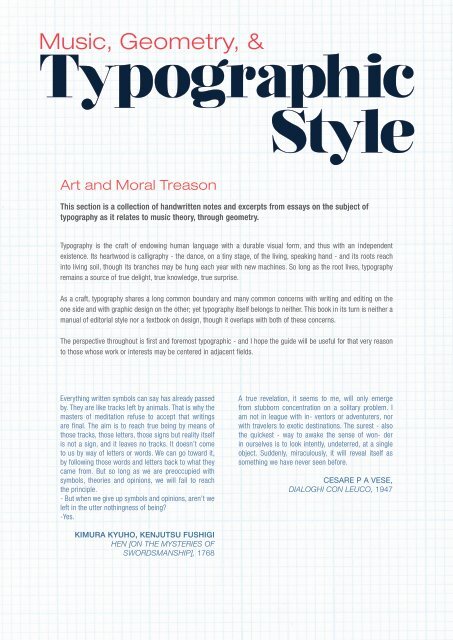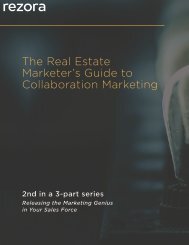5 Trick Pony Brand Guidelines v3
Create successful ePaper yourself
Turn your PDF publications into a flip-book with our unique Google optimized e-Paper software.
Music, Geometry, &<br />
Typographic<br />
Style<br />
Art and Moral Treason<br />
This section is a collection of handwritten notes and excerpts from essays on the subject of<br />
typography as it relates to music theory, through geometry.<br />
Typography is the craft of endowing human language with a durable visual form, and thus with an independent<br />
existence. Its heartwood is calligraphy - the dance, on a tiny stage, of the living, speaking hand - and its roots reach<br />
into living soil, though its branches may be hung each year with new machines. So long as the root lives, typography<br />
remains a source of true delight, true knowledge, true surprise.<br />
As a craft, typography shares a long common boundary and many common concerns with writing and editing on the<br />
one side and with graphic design on the other; yet typography itself belongs to neither. This book in its turn is neither a<br />
manual of editorial style nor a textbook on design, though it overlaps with both of these concerns.<br />
The perspective throughout is first and foremost typographic - and I hope the guide will be useful for that very reason<br />
to those whose work or interests may be centered in adjacent fields.<br />
Everything written symbols can say has already passed<br />
by. They are like tracks left by animals. That is why the<br />
masters of meditation refuse to accept that writings<br />
are final. The aim is to reach true being by means of<br />
those tracks, those letters, those signs but reality itself<br />
is not a sign, and it leaves no tracks. It doesn’t come<br />
to us by way of letters or words. We can go toward it,<br />
by following those words and letters back to what they<br />
came from. But so long as we are preoccupied with<br />
symbols, theories and opinions, we will fail to reach<br />
the principle.<br />
- But when we give up symbols and opinions, aren’t we<br />
left in the utter nothingness of being?<br />
-Yes.<br />
A true revelation, it seems to me, will only emerge<br />
from stubborn concentration on a solitary problem. I<br />
am not in league with in- ventors or adventurers, nor<br />
with travelers to exotic destinations. The surest - also<br />
the quickest - way to awake the sense of won- der<br />
in ourselves is to look intently, undeterred, at a single<br />
object. Suddenly, miraculously, it will reveal itself as<br />
something we have never seen before.<br />
CESARE P A VESE,<br />
DIALOGHI CON LEUCO, 1947<br />
KIMURA KYUHO, KENJUTSU FUSHIGI<br />
HEN [ON THE MYSTERIES OF<br />
SWORDSMANSHIP], 1768





